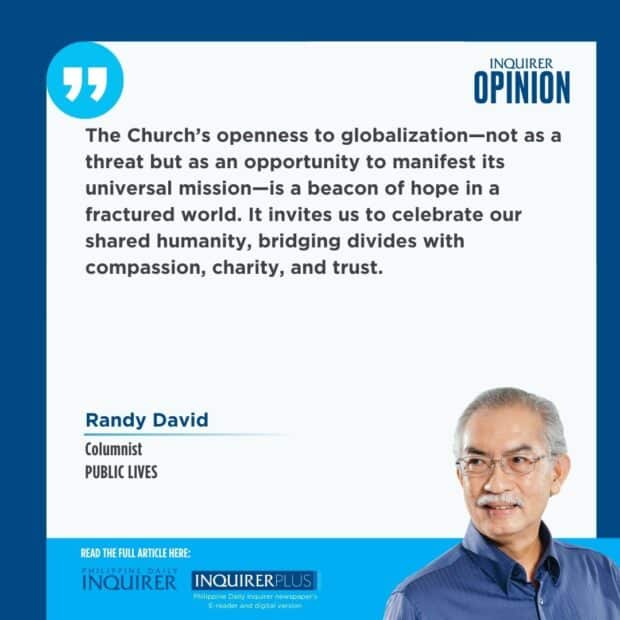The Church in a globalized world

While many nations, particularly the wealthier ones that profited from its early forms, now reject globalization and its consequences, the Catholic Church, under Pope Francis’ leadership, has chosen a path of acceptance of its challenges and an openhearted embrace of its myriad victims. Seeing itself as a “field hospital” that prioritizes care for the marginalized and alienated, the global Church affirms the very essence of the word “catholic,” which means universal inclusivity.
A striking testament to this universal vision was the creation of 21 new cardinals, including my brother, Bishop Ambo, on Dec. 7 at a consistory in St. Peter’s Basilica. I was privileged to witness this momentous occasion, together with fellow Filipino pilgrims who accompanied him as he entered this new phase in his consecrated life.
The new cardinals represent 17 nations across five continents, underscoring the Church’s global reach. Among them are three from Asia (the Philippines, Japan, and India), five from Latin America (Peru, Argentina, Ecuador, Chile, and Brazil), two from Africa (Ivory Coast and Algeria), three from Eastern Europe (Serbia, Lithuania, and Ukraine), two from Western Europe (Britain and Belgium), and one from North America (Canada). The remaining five, Italian prelates with extensive missionary experience, further illustrate the Church’s commitment to reaching even the remotest corners of the world.
Beyond geographic diversity, the cardinals also reflect a rich variety of backgrounds in their memberships within religious congregations and communities of faith. Cardinal Fabio Baggio, for example, is a Scalabrini priest dedicated to the plight of migrants and refugees. Having lived in the Philippines, he now serves as undersecretary of the Migrants and Refugees Section of the Dicastery for Promoting Integral Human Development. Then there’s Cardinal Angelo Acerbi, 99 years old, whose remarkable career as a Vatican diplomat saw him stationed in diverse countries, from New Zealand to Colombia. His steadfast faith was evident when, as a hostage of Colombian guerrillas in 1980, he celebrated Mass daily while in captivity.
Another notable appointee, Cardinal George Jacob Koovakad of Kerala, India, used to handle the Pope’s international travels. Now, he returns to his roots in the Syro-Malabar Catholic Church, one of 23 Eastern Rite churches in full communion with the Pope. This community, which traces its origins to St. Thomas’ missionary work, beautifully integrates Indian cultural elements into Christian liturgy, showcasing the richness of diversity within the universal Church. Likewise, many of the other cardinals come from orders and communities deeply involved in social justice, education, and interfaith dialogue, reinforcing the Church’s mission to serve an interconnected world.
This diversity is not confined to distant lands. Within Italy itself, a country that once sent countless missionaries abroad, the Church’s inclusivity has come full circle. Today, for every Italian priest serving overseas, five foreign-born priests, many from Africa, serve in Italian parishes. At the Dec. 7 consistory, the Pope, seated in his wheelchair, was assisted by six priests who appeared to hail from India, Congo, or Cameroon—a vivid image of the Church’s center drawing strength from its peripheries.
Two days after receiving his red hat, Cardinal Ambo celebrated Mass in Guardialfiera, a picturesque village in Italy’s Campobasso province. This visit was deeply symbolic. Though no longer the titular bishop of this medieval town, Cardinal Ambo maintained deep ties with its people, who had written him letters of comfort and prayed for him during his legal battles under the Duterte administration. In 2008, my wife Karina and I joined him on his second visit to Guardialfiera. I wrote about that visit in my Inquirer column. (https://tinyurl.com/mr4xjcbu)
That enduring connection culminated in a joyous reunion as a busload of Guardialfierans traveled to Rome to witness his elevation. Two days later, the new Filipino cardinal reciprocated their support by visiting Guardialfiera, accompanied by us—his siblings. It felt like returning to our hometown of Betis, as we were embraced by the warmth and hospitality of the Italian people. The mayor, a former communist, and the parish priest, an Indian missionary affectionately called Father Anbu, greeted us at the village entrance. Watching them walk ahead together, I captured a poignant image of harmony between Church and State, as well as the unity of diverse cultures in our globalized world.
The Church’s openness to globalization—not as a threat but as an opportunity to manifest its universal mission—is a beacon of hope in a fractured world. It invites us to celebrate our shared humanity, bridging divides with compassion, charity, and trust.
—————-
public.lives@gmail.com




















